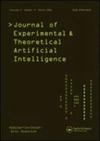一个Prolog应用程序,用于推理数学难题与图表
IF 1.7
4区 计算机科学
Q3 COMPUTER SCIENCE, ARTIFICIAL INTELLIGENCE
Journal of Experimental & Theoretical Artificial Intelligence
Pub Date : 2022-04-19
DOI:10.1080/0952813X.2022.2062456
引用次数: 2
摘要
尽管人工智能取得了无可争议的进步,但一些对人类来说相当容易的任务对机器来说仍然是一个挑战。一个典型的例子是用图表解决数学难题。亚符号化方法在图像识别和自然语言处理等领域已经被证明是成功的,但将这些技术结合成一种多模态方法来识别谜题的答案似乎是一个推理问题,更适合符号化技术的应用。在这项工作中,我们使用逻辑编程对拼图图进行空间推理,并将推导知识整合到解决过程中。通过对某国际人类智力竞赛难题解题策略的分析,提出了Prolog推理库的设计原则,并与图像处理软件进行交互,形成了难题的约束条件。该库集成了来自不同来源的知识,并依靠Prolog推理引擎提供答案。这项工作可以被认为是实现机器从文本图形表示开始在通用上下文中自主解决问题的雄心勃勃的目标的第一步。这种能力可以潜在地帮助每一次人机交互。本文章由计算机程序翻译,如有差异,请以英文原文为准。
A Prolog application for reasoning on maths puzzles with diagrams
ABSTRACT Despite the indisputable progresses of artificial intelligence, some tasks that are rather easy for a human being are still challenging for a machine. An emblematic example is the resolution of mathematical puzzles with diagrams. Sub-symbolical approaches have proven successful in fields like image recognition and natural language processing, but the combination of these techniques into a multimodal approach towards the identification of the puzzle’s answer appears to be a matter of reasoning, more suitable for the application of a symbolic technique. In this work, we employ logic programming to perform spatial reasoning on the puzzle’s diagram and integrate the deriving knowledge into the solving process. Analysing the resolution strategies required by the puzzles of an international competition for humans, we draw the design principles of a Prolog reasoning library, which interacts with image processing software to formulate the puzzle’s constraints. The library integrates the knowledge from different sources, and relies on the Prolog inference engine to provide the answer. This work can be considered as a first step towards the ambitious goal of a machine autonomously solving a problem in a generic context starting from its textual-graphical presentation. An ability that can help potentially every human–machine interaction.
求助全文
通过发布文献求助,成功后即可免费获取论文全文。
去求助
来源期刊
CiteScore
6.10
自引率
4.50%
发文量
89
审稿时长
>12 weeks
期刊介绍:
Journal of Experimental & Theoretical Artificial Intelligence (JETAI) is a world leading journal dedicated to publishing high quality, rigorously reviewed, original papers in artificial intelligence (AI) research.
The journal features work in all subfields of AI research and accepts both theoretical and applied research. Topics covered include, but are not limited to, the following:
• cognitive science
• games
• learning
• knowledge representation
• memory and neural system modelling
• perception
• problem-solving

 求助内容:
求助内容: 应助结果提醒方式:
应助结果提醒方式:


